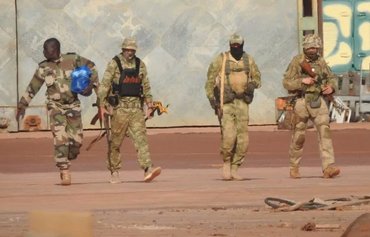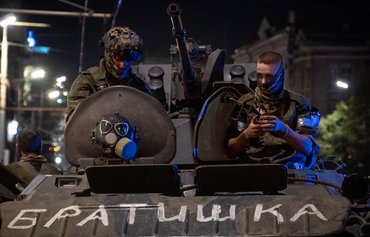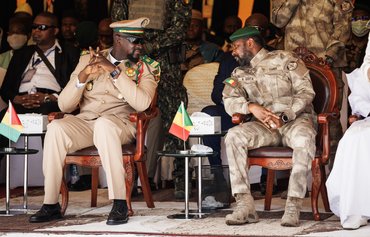NOUAKCHOTT, Mauritania -- The recent standoff between the Wagner Group and the Russian state has raised concern in African countries that have partnerships with the mercenary group about the future of these relationships.
The insurrection against Moscow, led by Wagner Group boss Yevgeny Prigozhin, will have repercussions on the security of African countries where the mercenary group has a presence, even though it was aborted, African analysts said.
Prigozhin on Friday and Saturday (June 23 and 24) led a short-lived insurrection during which his fighters seized military bases and marched towards Moscow. He then unexpectedly ordered them to stop their march and turn back.
The United States on Monday renewed its warnings to African nations regarding the risks of partnering with Wagner Group mercenaries and the instability the mercenary group brings with it when it intervenes in a conflict.
![A man with a flag bearing the Wagner Group logo is seen in Rostov-on-Don, Russia, on June 24. [Roman Romokhov/AFP]](/cnmi_am/images/2023/06/30/42818-Wagner-Group-logo-600_384.jpg)
A man with a flag bearing the Wagner Group logo is seen in Rostov-on-Don, Russia, on June 24. [Roman Romokhov/AFP]
![Russian President Vladimir Putin holds a minute of silence on the grounds of the Kremlin in Moscow on June 27 for pilots killed during a revolt by Wagner Group mercenaries. [Sergei Guneyev/AFP]](/cnmi_am/images/2023/06/30/42819-Putin-moment-silence-600_384.jpg)
Russian President Vladimir Putin holds a minute of silence on the grounds of the Kremlin in Moscow on June 27 for pilots killed during a revolt by Wagner Group mercenaries. [Sergei Guneyev/AFP]
"Any time Wagner enters the country, death and destruction follow," US State Department spokesman Matthew Miller said.
"You see Wagner exploit local populations, we see them extract local wealth, we see them commit human rights abuses," he added.
Problematic behaviour
Days before the mutiny in Russia, Wagner Group fighters in Africa kidnapped 22 Mauritanians from a village near the Mauritania-Mali border, causing panic among the local population.
On June 21, dozens of their relatives protested outside the Interior Ministry in Nouakchott to demand that the government reveal their fate.
One of the protesting family members told local media that the missing Mauritanians had been kidnapped three days earlier in the Malian village of Lobit, around 35km from the Mauritanian border.
Wagner Group gunmen rounded up the villagers and took their possessions, before singling out 22 people and taking them on board a plane, the source said.
"The danger Wagner Group elements pose to the security and stability of the border population in Mali and Mauritania is now the number one threat to thousands of traders and shepherds," said Malian journalist Moussa Bakari.
These people "rely on commodity trade and livestock along the border between the two countries" for their livelihoods, he told Al-Mashareq.
The recent kidnappings "were preceded by killings and kidnappings of citizens in northern Mali at the hands of the same group, without the local authorities doing anything to stop such crimes", he added.
The Mauritanian authorities have not made any public moves in this regard.
Africa a point of contention
"This is not just a casual dispute but a more profound dispute," said Sayed Ahmed Ould Atfil, an analyst of conflicts in the Sahel region, of the Wagner Group's aborted mutiny and widening rift with Moscow.
"Wagner's presence in Africa is probably one of the most contentious issues between the two sides," he told Al-Mashareq.
In Africa, he said, the Wagner Group started to adopt an independent approach after securing "many financial privileges in countries like Mali, and probably Burkina Faso and the Central African Republic (CAR)".
"This has angered Moscow, which wants to exploit Wagner's presence to further its economic and political interests on the African continent," he said.
Atfil said he anticipates that the differences between Moscow and Wagner over the group's presence in Africa will intensify, as the money the group receives for the services it provides to African governments consolidates its power.
This in turn gives it more power against the regime of Russian President Vladimir Putin, he said.
In a Monday interview with Russia Today (RT), Russian Foreign Minister Sergey Lavrov said the mutiny would not alter the Wagner Group's presence in Africa.
He noted that the governments of Mali and the CAR "have official contacts with our leadership" and that several hundred soldiers are working in the CAR as instructors at their request, and will continue to do so.
But analysts said Lavrov's statements -- and Putin's later claim that Moscow had paid out over $1 billion to the Wagner Group last year -- are just a message of reassurance to Moscow's allies in Africa, especially Mali, the CAR, Sudan and Libya.
"It's natural that Moscow will send messages to reassure its allied African presidents as some of them rely on Wagner's security protection, as is the case in Mali," analyst Bashir Babana told Al-Mashareq.
"Mali's government has a dual partnership with the Russian state, on the one hand, and the Wagner Group, on the other," he added.
"Any tension in relations between Wagner and Putin's regime will put Bamako's rulers in an awkward position."
Complex network in Africa
Since 2018, the mercenary group has created an extensive and complex network of relationships and activities in African countries including Sudan -- where it has been accused of fueling the conflict -- the CAR, Mali and Libya.
Reports indicate there are some 3,000 Wagner Group elements in Mali and at least 1,000 in the CAR working as instructors, with thousands more deployed in other parts of the continent.
On Tuesday, following the Wagner Group's weekend mutiny, the United States announced new sanctions targeting the mercenary group's activities in the CAR, AFP reported.
The sanctions target Midas Ressources SARLU, which owns several mines in the CAR, and also Diamville, a gold and diamond purchasing company.
The two companies are managed by Prigozhin, the US Treasury said.
The sanctions also target Industrial Resources General Trading, a Dubai-based industrial goods distributor accused of managing Diamville's business.
"The Wagner Group funds its brutal operations in part by exploiting natural resources in countries like the CAR and Mali," said Treasury official Brian E. Nelson.
"The United States will continue to target the Wagner Group's revenue streams to degrade its expansion and violence in Africa, Ukraine and anywhere else," he added.

![Members of the Wagner Group look out from a military vehicle in Rostov-on-Don -- ground zero of the group's botched mutiny against the Russian state -- on June 24. [Roman Romokhov/AFP]](/cnmi_am/images/2023/06/30/42817-Wagner-Group-Russia-600_384.jpg)






